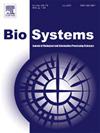原自我产生的原源性信息耗散(PID)
IF 1.9
4区 生物学
Q2 BIOLOGY
引用次数: 0
摘要
本研究引入了一个理论框架,其中意识作为普里格尼信息耗散(PID)的结果而出现,这是一个动态过程,通过该过程,信息在远离平衡的系统中产生。通过模拟由耗散反馈控制的粒子相互作用,这项工作展示了结构、记忆和复杂性是如何进化的,最终形成了由系统质心代表的原型自我。这个质心从统计平均值转变为信息吸引子,体现了递归反馈和自创生相干性。该分析结合了熵度量、李雅普诺夫指数和非线性动力学来跟踪系统从有序到混沌的轨迹。结果支持了信息耗散是认知和自组织系统起源的基础这一假设。与先前的模型将信息视为预先存在的不同,这种方法将其视为突现的,将认知和意识置于热力学和信息论过程中。这些发现提出了一种关于生命和心灵的综合观点,假设意识不是单独来自结构,而是来自耗散系统中信息的递归稳定。本文章由计算机程序翻译,如有差异,请以英文原文为准。
Prigoginian informational dissipation (PID) as the cause of the emergence of a proto-self
This study introduces a theoretical framework where consciousness emerges as a consequence of Prigoginian Informational Dissipation (PID), a dynamic process through which information arises in far-from-equilibrium systems. By modelling particle interactions governed by dissipative feedback, the work demonstrates how structure, memory, and complexity evolve, culminating in a proto-self represented by the system centroid. This centroid transitions from a statistical average to an informational attractor, embodying recursive feedback and autopoietic coherence. The analysis incorporates entropy metrics, Lyapunov exponents, and nonlinear dynamics to trace the system trajectory from order to chaos. Results support the hypothesis that informational dissipation underlies the genesis of cognitive and self-organizing systems. Unlike prior models treating information as pre-existent, this approach frames it as emergent, situating cognition and consciousness within thermodynamic and information-theoretic processes. The findings advance an integrative view of life and mind, positing that consciousness arises not from structure alone, but from recursive stabilization of information in dissipative systems.
求助全文
通过发布文献求助,成功后即可免费获取论文全文。
去求助
来源期刊

Biosystems
生物-生物学
CiteScore
3.70
自引率
18.80%
发文量
129
审稿时长
34 days
期刊介绍:
BioSystems encourages experimental, computational, and theoretical articles that link biology, evolutionary thinking, and the information processing sciences. The link areas form a circle that encompasses the fundamental nature of biological information processing, computational modeling of complex biological systems, evolutionary models of computation, the application of biological principles to the design of novel computing systems, and the use of biomolecular materials to synthesize artificial systems that capture essential principles of natural biological information processing.
 求助内容:
求助内容: 应助结果提醒方式:
应助结果提醒方式:


